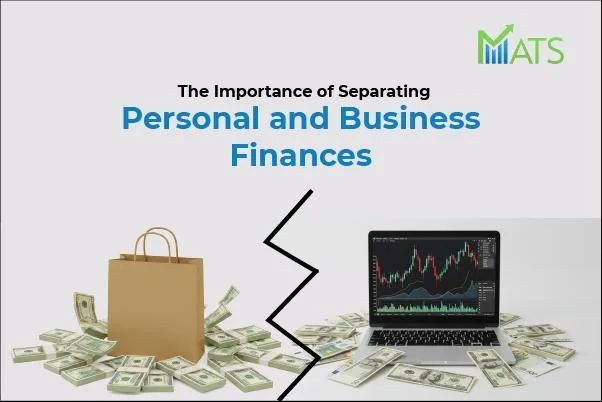Read Our Latest Blogs
Our blog is dedicated to providing Atlanta business owners with valuable insights, expert tips, and the latest updates on tax preparation, planning, and compliance. Whether you're looking to catch up on overdue filings, navigate complex tax laws, or simply stay informed about best practices, you'll find the resources you need right here. Dive into our articles and discover how proactive tax management can benefit your business and help you achieve financial success.
Join Our Email List

The Importance of Separating Personal and Business Finances
Introduction
One of the most common mistakes entrepreneurs make is failing to separate business and personal finances. While it may seem harmless in the early days of your venture, the long-term consequences can be severe, from tax complications and poor cash flow to potential legal issues and missed growth opportunities.
In this blog post, we'll explore why keeping your finances separate is critical for business success, how to do it effectively, and the tools that make it easy. If you're serious about building a sustainable and legally sound business, this guide is for you.
Why You Must Separate Business and Personal Finances

1. Legal Protection and Liability
When you form a legal entity such as an LLC (limited liability company), your assets are protected—but only if you respect the separation between your business and personal finances.
Mixing your personal and business funds can lead to "piercing the corporate veil," which means courts may hold you personally liable for business debts. If someone sues your company, your house, car, and personal savings could be at risk.
✅ Learn more about forming an LLC
2. Simpler, Cleaner Tax Filing
The IRS expects your business and personal transactions to be clearly distinguishable. When finances are mixed, filing taxes becomes a nightmare.
You could miss deductions because you can't verify business expenses.
You may end up overpaying or underpaying taxes, risking an audit.
Reconciling income and expenses becomes unnecessarily complicated.
Using accounting software like QuickBooks ensures your books are organized and tax-ready.
3. Improved Financial Decision-Making
When business and personal finances are mixed, it's difficult to get a clear picture of your company's profitability, cash flow, or financial health.
With a dedicated business bank account and bookkeeping system:
You can track income and expenses accurately.
Understand your break-even point.
Budget for growth, investments, or hiring.
This clarity is critical for sustainable business growth.
How to Separate Business and Personal Finances
1. Open a Business Bank Account
This is the first and most important step. A business account clearly separates business transactions from personal purchases.
We recommend Mercury Bank for startups and small businesses. It offers no monthly fees, intuitive dashboards, and seamless integrations with tools like QuickBooks.
Open your Mercury business bank account now
2. Get a Business Credit or Debit Card
Use this card exclusively for business expenses. This allows you to:
Track purchases easily.
Avoid mingling funds.
Build business credit over time.
Pro Tip: Set up alerts and monthly summaries to monitor spending patterns.
3. Use Accounting Software
Tools like QuickBooks, Xero, or FreshBooks help automate bookkeeping. You can connect your business accounts, categorize expenses, send invoices, and track payments in one dashboard.
✅ Affiliate Link: Try QuickBooks for automated business accounting
4. Pay Yourself a Salary or Owner's Draw
Instead of dipping into business funds when you need cash, pay yourself consistently. This creates a predictable expense and keeps your books clean.
LLCs typically use owner's draws.
S-Corps and corporations pay salaries through payroll.
It's wise to consult a tax advisor to structure this correctly.
5. Track Mileage and Expenses Separately
If you use your car or home office for business, track these expenses separately. Tools like MileIQ or QuickBooks can automate mileage logging.
Don't pay for gas, groceries, or movie tickets from your business account—even if you're the only employee.
Common Pitfalls to Avoid
❌ Using One Bank Account for Everything
Even if you're a sole proprietor, having a separate business bank account is crucial for transparency and tracking.
❌ Not Categorizing Expenses Properly
Categorizing business vs. personal expenses correctly is essential for maximizing deductions and keeping your accountant (and the IRS) happy.
❌ Failing to Keep Receipts or Invoices
Always store receipts and invoices for your business expenses. Apps like QuickBooks let you snap and upload receipts on the go.
❌ Co-Mingling Funds
Never move money between accounts without documentation. Use official transfers and log them correctly.
Real-Life Example: Why It Matters
Let's say Sarah runs a freelance design business. She uses her checking account for client payments and pays for both groceries and business subscriptions from the same debit card.
At tax time:
She spends hours sorting through bank statements.
She misses $2,300 in deductible expenses because she can't prove they were business-related.
She's flagged for an audit because of inconsistent reporting.
Contrast this with John, who uses Mercury for banking and QuickBooks for accounting and pays himself through a payroll tool. His books are clean, his taxes are optimized, and he spends just one hour preparing for tax season.

Tools to Make It Easy
Here's a shortlist of recommended tools to help you separate and manage your finances effectively:
Tool Purpose Link
Mercury Bank: Open a free business account . Open an Account
QuickBooks Bookkeeping & Accounting Try QuickBooks
Gusto or Deel Payroll for small businesses
CRM Tool: Manage customer relationships. Learn CRM Basics
✅ Read our blog on CRM Basics for Small Businesses
When you mix finances, you're more likely to lose track of customer payments, vendor bills, and recurring subscriptions. This can:
Harm your business credit score
Lead to missed tax payments
Confuse investors or lenders reviewing your finances
If you're planning to scale, apply for funding, or hire employees, clean books and financial transparency are non-negotiable.
Final Thoughts
Separating your business and personal finances isn't just about bookkeeping—it's about running a serious, legal, and sustainable business. Whether you're freelancing part-time or managing a growing startup, keeping clean financial records is key to long-term success.
.
Ready to Get Your Business Finances in Order?
Book a free consultation with a certified tax and business advisor to get help setting up your finances, choosing the right tools, and ensuring compliance.

Hear What Our Clients Say
See Our Google Reviews

George Owens

MATS did such a great job on my taxes! This was my first year filing as a real estate agent and they were quick, efficient, personable and worked throughout the weekend to make sure I met the tax deadline. It was an easy process of filing with a simple app and I saved thousands on my tax bil

Max Tanner

I’ve been a happy client of Madison’s Accounting and Tax services for about 3 years now. They have not only done an excellent job of handling my taxes, as I have several businesses, they have increased my tax knowledge as well. I love that as my business continues to grow they are constantly working to keep my finances straight in a creative yet compliant way. I highly recommend.

Kim Wexler

MATS allowed me to make informed decisions and optimize my return, while enlightening me on how I can improve my outcome for the upcoming tax year. I am satisfied and I am excited to continue working with this awesome business.

Billy Jackson

MATS has supported our taxes for a few years and consistently delivers in a timely manner. They take the weight of intricate filing of several forms off your shoulders. We appreciate their timely communication and care for their customers.


© 2025 Madison's Accounting & Tax Services LLC - All Rights Reserved. Terms of Service | Privacy Policy
470-665-5503

